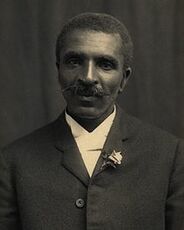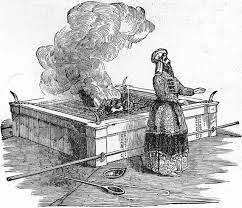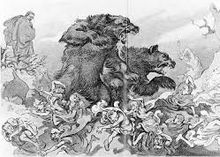 Peanut-sized Prayer - George Washington Carver Lately I’ve been reading about prayer. What has been wonderful is that the direction of the author I’ve read is not primarily a theological treatise on prayer. It has been more of the practical work of walking with and seeking God. The reading I did today touched on the life of George Washington Carver. Carver did not have an easy life. He was born toward the end of the Civil War to a family of slaves on the Moses Carver farm. He, his sister, and mother were kidnapped by the Kentucky night raiders. George was rescued and returned to the Carvers who raised him and his brother James. George lived in a deeply segregated south where it was very difficult for a black child to receive an education. Yet through perseverance He not only graduated from high school, but also graduated from what is now known as Iowa State University. He studied botany there as their first black student, and eventually became their first black faculty member. His thirst for learning eventually led him to receive a Master’s degree in botany where he became well-known for his work in plant pathology and mycology. After receiving his Master’s degree he joined Booker T. Washington at what would become Tuskegee University in Alabama. There was another side to Carver. He was a very godly man who know the Lord. At age 10 he had the following conversation with his foster father when he asked him about grapes. “Why are grapes purple?” George asked. “Nobody knows.” his foster father replied. “Does God know?” George asked. “Of course he does.” “Then I’ll ask him,” George responded, and left the room. That was the simple faith of George Washington Carver. His foster father was amazed. He said, "George shouldn’t talk that way. He sounded as if he were going to meet God out there – around the house.” Fortunately for him - and for us - George didn’t think that way. He developed a lifestyle of prayer that stayed with him throughout his entire life. Those who knew him said he would rise at 4 or 5 a.m and pray to start his day. And George kept on praying like he could go around the house and meet God. Alabama and the surrounding southern states were experiencing hard times because they were farming the ground too hard. Dr. Carver taught farmers how to rotate crops. He introduced planting peanuts as an alternative crop to help with this problem. The only difficulty was that there was not a market for all the peanuts that were grown. Dr. Carver began praying about this. One of his favorite Bible verses was from the book of Job. But ask the animal, and they will teach you, Or the birds of the sky and they will tell you; Or speak to the earth, and it will teach you, Or let the fish in the sea inform you. He was certain that if he prayed and sought God, that God would give him wisdom to develop ways to use the peanut. In his own wonderfully humble words Dr. Carver related his conversation with God. I asked God, “Why did you make the universe, Lord? “Ask for something more in proportion to that little mind of yours,” God replied. “Why did you make the earth, Lord?” I asked. “Your little mind still wants to know far too much. ask for something more in proportion to that little mind of yours,” replied God. “Why did you make man, Lord?” I asked. “Far too much. Far too much. Ask again.” replied God. “Explain to me why you made plants, Lord?” I asked. “Your little mind still wants to know far too much,” the Lord replied. “The peanut?” I asked meekly. “Yes! For your modest proportions, I will grant you the master of the peanut. Take it inside your laboratory and separate it into water, fats, oils, gums, resins, sugars, starches, and amino acids. Then recombine these under my three laws of compatibility, temperature, and pressure. Then you will know why I made the peanut.” God said. God was true to His promise, and Dr. Carver was true to his work. He eventually found 300 uses for the peanut. The “National Peanut Board” reported that Dr. Carver’s labors revealed that food products from peanuts involved such things as peanut lemon punch, chili sauce, caramel, peanut sausage, mayonnaise and coffee. Then he experimented and learned that cosmetics could be derived from peanuts. The cosmetics included face powder, shampoo, shaving cream and hand lotion. Not satisfied there he also learned that insecticides, glue, charcoal, rubber, nitroglycerine, plastics and axle grease were a few of the many valuable products derived from peanuts. Peanuts, once a non-cash crop, by 1938 became a $200 million industry and one of the chief products of Alabama. One of my favorite stories about Dr. Carver is when he was allowed to testify before the House Ways and Means Committee on behalf of the United Peanut Association of America. He was informed by chairman Joseph Fordney that he would receive 10 minutes to testify. Dr. Carver enthralled the committee for an hour and 45 minutes about all that God had taught him about the lowly peanut. He spoke of shaving cream and soap, of cosmetics and wood stains, of glue and linoleum. He even shared with the committee about Worcestershire sauce! When he finished, chairman Fordney told Dr. Carver he could come back whenever he wanted and have as much time as he wanted. All this from one humble man who turned to God for help about how he could use the little ole peanut. This godly man, who turned to the Lord early each morning, was willing to listen to God as He spoke through the earth and the plants to teach him. And what a glorious set of lessons God gave him. Dr. Carver didn’t seek patents for all of his ideas. He simply said if God gave them to him, he wanted to give them freely to others. Oh, and by the way, he also learned from the glamorous sweet potato as well, sharing over 100 different uses for it as well. Dr. Carver faced a huge, God-sized problem. He had a multitude of peanuts - but no real profitable use for them. Dr. Carver knew from a lifetime of walking with and praying to God - that God had a wonderful answer if he would just seek God. “Call to me and I will answer you and tell you great and mighty things which you do not know.” Jeremiah 33:3, NASB Dr. Carver called. God answered and told him. Dr. Carver then used every last ounce of his learning and ability to follow God. Amazing things happened. Kind of astounding what the peanut-sized prayers of a godly man produced? So - what is it that you need to take to God and humbly ask for His help with today?
1 Comment
 Why is it good to understand God theologically? It is a very good thing to understand Who God is. It will protect you from error and from erroneous living. Let me give you an example from my own life this past week. Earlier this week I was wrestling with a few things in my life. They were not exactly earth-moving issues – but they were at the time a challenge for me – and were dominating a lot of my time. As I wrestled with this I had a thought come into my head. “Why are you so stuck on such a little thing? Do you really think you need to waste God’s time on this? You need to drop this and get busy with far more important things.” At first I wondered if this was God? When I did receive it as if it were from Him – I felt a little ashamed at my wrestlings. Certain God has more important things to work on in life that these reasonably small issues. So in response to this – I took all I had been thinking upon and shoved it down to the “seriously unimportant” shelf in my mind. Later in the week I was reading of Who God is in the book of Isaiah. He is infinite. There is a theological truth. God is the infinite God. There are no limitations to God – EVER. He is infinite in power, strength, wisdom – and just add whatever else comes to mind. My earlier wrestlings came back to mind – but this time with this verse about God’s infinite nature attached. Then some new questions came to mind. Does God have a finite number of things He can deal with each day? Does He have some schedule where unless I have something important – He doesn’t have time for it? Is it taxing to God to have to deal with – oh, let’s say, the conflict in Syria – and other wars – and then to have to deal with my little pittance of a problem too? Can God ever get tired – or worn down – or exhausted with too much to do? It didn’t take long for me to realize that God, being both infinite in power – and eternally timeless, is not annoyed with the wrestlings of my heart. When I come to Him – He is concerned with the big things as well as with the little things (at least what I was calling little). Being infinite, He is never taxed or worn down – even if He had a million different problems voiced by a 7 billion people a day! He is infinite – and whatever number I put before Him (thinking it to be a real stunner) – it is infinitely small in comparison to Who He truly is. He does not have some schedule with a limited number of spots available for His time – like I do. He is limitless! Why was it good to understand God theologically this week? Because in grasping Him as He is – an eternal, infinite God – I came to grips with the fact that there is nothing too small for me to bring to Him. He is great because He can handle the big things! He is also great because He can handle a trillion little things – and never feel like He’s too busy to listen to me when I come to Him. What was the result of grasping God theologically this week in the midst of wrestling with my issues – even though they seemed a little small and trivial to me in the moment? It was to grasp that God is infinitely more than able to handle every big thing, every little thing – actually . . . everything that I have. Oh, and by the way, He is infinitely more than able to handle that for every single person on this planet . . . and not feel rushed, frustrated, overwhelmed, overtaxed, or over-committed. He does it all – every day of every year – every year of every decade – every decade of every century – every century of every millennium – and He never grows tired or weary! THAT, MY DEAR PRECIOUS SAINTS – IS GOD – THEOLOGICALLY AND PRACTICALLY REALIZED! HALLELUJAH!  I'm leaving after this election! I decided that if the Republicans win - I'm leaving. I decided that If the Democrats win - I'm leaving. I'm leaving the world where it's me against them. I'm leaving the world where it's OK to slander those who disagree with my view - rather than maybe, I don't know, maybe talk with them and try to grow in understanding one another. I'm leaving the world where I think the worst about those who don't share my views. I'm leaving the world where there are lines drawn that cannot be crossed - not lines of what I believe or what moral or ethical standards I live by - but lines that we can't cross to talk to each other. I'm leaving the world where we think an election is what will change things - that new laws - new executive orders - even new Supreme Court Justices will actually change things in our country and in our lives. I'm leaving the world where I myself, as well as all others around me, have their identity described by two labels - the "good one" I call myself - and the "bad one" the other side calls me. I'm leaving the world where I can be manipulated by a political party to the point where I immediately characterize people (without ever getting to know them) by which party they associate with at the time. I'm leaving because I want to rediscover Someone Who commanded me to prove I am His disciple by the way I love my brothers and sisters in Christ. I'm leaving because I want to rediscover Someone Who said that His kingdom was not of this world. I'm leaving because I want to rediscover Someone Who put a Zealot and a Tax Collector in His group - and they didn't wind up killing each other - or at least protesting one another. I'm leaving because I want to rediscover how to lose my life so that I can gain it - to give my life and my rights away so others can be blessed - to consider others better than myself. I'm leaving because I want to rediscover the One Who gave His life away - who laid down His rights as God (even though He WAS God) - Who took my sin and my sorrows - Who even paid the price of my sin - Who was despised and forsaken - misunderstood - mischaracterized - mistreated - and yet considered it all joy when He considered all those who would be blessed as a result. I don't want Trump or Pelosi - Democrat or Republican - Conservative or Liberal - Socialist or Capitalist - or any other label or leader to be associated with my name any longer. I'm leaving to follow Jesus. I'm leaving to live for His kingdom and His righteousness. I'm leaving because the world's mindset - the Republican's mindset - the Democrat's mindset - honestly - even my own mindset - are not the mindset by which I need to live and make my decisions. I hope to have the mind of Christ. So . . . I'm gone. I am crucified with Christ, nevertheless I live - yet not I, Christ lives within me. The life I want to live, I live by faith in the Son of God - Who loved me and delivered Himself up for me. As I leave I have a prayer - May the words of my mouth and the meditations of my heart be acceptable to You, my Rock and My Redeemer.  A Soothing Aroma Leviticus 1-3 When reading through Leviticus, you will not run into a story line. What you will experience is instructions about offerings. If that is all you look for in this volume of the Scriptures, you will tend to get lost in exactly what a burnt, grain, or peace offering is. But the most important thing we should consider is how all these offerings and instructions point us to Christ. That is what will transform the book of Leviticus from endless instructions about preparing sacrifices to a reminder of what the sacrifice of Jesus means to God and to us. Without Defect The first thing we see about the sacrifices presented in these first two chapters is the phrase, “without defect.” Any sacrifice had to be this way. It is because they are a foreshadowing of Christ - who was sinless. When we read this we should be reminded of Christ’s perfections - and thank God for His perfect, sinless Son who came to be our sacrifice. When it comes to the grain offering in chapter 2 we read that the sacrifice had to have “frankincense” added to it. Frankincense was a substance that was used as a type of incense in preparation of a body for burial. It gave off a soothing smell that replaced the smell of death and decay. As a type it is a reminder of the death of Christ and how it is a soothing kind of smell to God. A Soothing Aroma Every single one of these first three offerings is referred to as a “soothing aroma to Jehovah.” Eight times this is mentioned in the first three chapters of these series of offerings. The Hebrew word here is “nichoach” which means something quieting or soothing. The first time it is used is after Noah’s flood. God smelled the offerings that Noah made after departing the Ark. He said after smelling the soothing aroma of the sacrifices that He would never again destroy every living thing on the earth. These “soothing aroma” sacrifices were to be made every morning and every evening before God according to Exodus 29. They were a reminder of God’s mercies and grace given to Israel - that He would not consume them for their sin. They were also a wonderful precursor to what God would do through Jesus Christ. The only time a purpose for the offering is given is in Leviticus 1:4 where we read that this was done, “that it may be accepted for him to make atonement on his behalf.” The soothing aroma was what God experienced when these offerings were made. It was a wonderful type of how God viewed and received the sacrifice of Jesus Christ. God’s wrath was upon us because of our sin. The glory of the gospel is that because of Christ’s sacrificial death on the cross - God was soothed. He looked upon that offering of His Son and it had a soothing, quieting effect on Him and His wrath toward sinful mankind. Thus, these three offerings in the first three chapters of Leviticus remind us of how the sacrifice of Jesus was pleasing and soothing to God. It is how God viewed the offering of His Son. Each of these offerings were presented at the “doorway of the tent of meeting.” One could not enter and be acceptable to God without these sacrifices. Unless the blood of a sacrifice without defect - or a grain offering with the embalming substance of frankincense was offered (all pictures of Christ’s sacrificial death on the cross) the worshipper could not enter. But when the type of Christ was offered (of which Jesus would be the ultimate fulfillment) there was the ability to come before God. My hope is that in knowing these things we can read Leviticus with a new gratefulness as we read of the types of Christ represented in these offerings. It is my hope and strong desire that a thankful worship will rise in our hearts. It is my hope that in our minds we would meditate on the sights and smells associated - and remember that as the true burnt offering, the true grain offering, the true peace offering was made - that it pleased God and made atonement for us. Hallelujah!  Lovin’ Leviticus, part 1 “Have you ever survived reading through Leviticus?” That is a question that is passed around by people when they are encouraged to read through the entire Bible. It is an unfortunate question though, because it approaches the book from the standpoint that everything in Bible reading needs to have a story – or be exciting. If it is not – then maybe it is something we should set aside for the theologians or for Bible nerds who like that kind of stuff. Leviticus is part of a progression in God’s revelation of Himself. Whether we realize it first or not, without Leviticus we are going to miss and very important part of that revelation. Let me explain and hopefully give you some encouragement as we read this book together over the next couple of weeks. Leviticus is the third book in the series of books that God had Moses give us as in His revelation of Himself. Genesis is a book of beginnings as well as a book that helped us to understand the problem mankind faces in approaching and knowing God. That problem is sin – and in Genesis we are exposed to how sin came into humanity and the extent to which it prevents us from having an ability to approach and know God. We are also introduced to God’s remedy for sin, the Seed of the woman (Jesus). Exodus is a book of deliverance as God recused a people from slavery. The key to the book is how we have been brought near to God through the blood of the lamb slain for us (Jesus). That is seen in the Passover as we are introduced to how a blood sacrifice delivers us from dead. Leviticus takes us further in the revelation of God – and is absolutely vital in helping us understand Who God is. When God revealed Himself to us in Exodus He is the God who dwelt on a mountain covered in fire. He was a God who was up there – apart from us. But by the end of the book God has provided a place here among us where we can approach Him – the Tabernacle. By the end of Exodus the Tabernacle is in place and becomes the place where mankind can approach God. Salvation came through the Paschal Lamb, but now we are taught to understand how we can fellowship with God through the blood that provides forgiveness of sins. This is where Leviticus takes up God’s revelation of Himself and does so by helping us understand two important things. Here we are introduced to the holiness of God as well as the sacrifices that bring us near Him. In understanding the types that are in Leviticus we are given a wonderful unfolding of the sacrifice of Christ in all of its many-sided facets. Each of these sacrifices has a meaning for us – and all point to Jesus and what He will do for us by His death on the cross. As God reveals the way of fellowship to us through Leviticus we are brought to two main realities. First is the “Ground of Fellowship” which we learn is the sacrifices. These sacrifices are given in two types – those that are voluntary and those, which are mandatory. The voluntary ones reveal how Christ was a sweet savor to God – whereas the non-voluntary ones are how Christ brings us to God. Before the first section is finished – we are presented with the sacrifices, the priesthood, and the altar that allows us to have fellowship with God. The second half of Leviticus presents to us the “Walk of Fellowship” which involves a separation to God. This is where we come to understand that God calls us with a holy calling – to be a people holy and separated unto Him. This is where we will be confronted with what God considers holy and what He reveals to be sin. We will also be reminded that sin requires punishment. In the New Testament we will learn that Jesus Christ has taken this punishment for us so that we can be a people separated unto God – so that we can be holy as He is holy. What we have before us is a book that will present to us both God’s Way and Walk of Fellowship. It is given to us in basic colors that will leave us with the basic impressions that God is holy, we need a blood sacrifice to bring us near to Him, and that fellowship with Him will involve being made a people who embrace and walk in holiness before Him. It is my hope that in understanding these basics about Leviticus that we can not approach this reading with a sense of dread and fear – but rather that we will be “lovin’ Leviticus” as we read through this very important part of God’s revelation of Who He is. Second Chronicles chapter 15 is part of the recounting of the history of the reign of King Asa and God’s gracious work during that time. It was a powerful period of Israel’s history in which God began to move mightily in reviving His people. Asa had turned to God, seeking Him and turning away from the idolatry that had grown under previous kings. God granted 10 years of peace to Judah because of this. After than time Judah was attacked by an army of a million men. As they went to battle Asa turned to God for the strength to fight and to give them the victory. It was the events after that which truly brought revival to Judah.
A prophet named Azariah came to Asa after that battle and prophesied to Him in the name of Jehovah. This was his prophecy: "Listen to me, Asa, and all Judah and Benjamin: the LORD is with you when you are with Him. And if you seek Him, He will let you find Him; but if you forsake Him, He will forsake you. 2 Chronicles 15:2 After hearing this prophecy there was also information that was given to us about that period of Judah’s history. For many days Israel was without the true God and without a teaching priest and without law. Spiritually it was a dark and difficult time. It was a very idolatrous time as well. Their idolatry had cost the nation dearly – and in this hour they turned from their idolatry and made a covenant with the living God, Jehovah. It is in this context that the following statement is made by the people as they made this covenant. “They entered into the covenant to seek the LORD God of their fathers with all their heart and soul; and whoever would not seek the LORD God of Israel should be put to death, whether small or great, man or woman. Moreover, they made an oath to the LORD with a loud voice, with shouting, with trumpets and with horns. There is something about this covenant that may disturb some in our day. It is the statement that “. . . whoever would not seek Jehovah God of Israel should be put to death, whether small or great, man or woman.” To those of us in our day of multiculturalism – this sounds harsh. Yet, in making their covenant with Jehovah, they were returning to a life lived by the Law of God. One of the things God stressed in His law was the great danger of idolatry. As a reminder of this, we would be wise to review the following passages in the Law concerning idolatry – and the response that God commanded toward it. Here are the three passages that deal with idolatry in the Law of God. "He who sacrifices to any god, other than to the LORD alone, shall be utterly destroyed. Exodus 22:20 "If your brother, your mother's son, or your son or daughter, or the wife you cherish, or your friend who is as your own soul, entice you secretly, saying, 'Let us go and serve other gods' (whom neither you nor your fathers have known, of the gods of the peoples who are around you, near you or far from you, from one end of the earth to the other end), you shall not yield to him or listen to him; and your eye shall not pity him, nor shall you spare or conceal him. "But you shall surely kill him; your hand shall be first against him to put him to death, and afterwards the hand of all the people. "So you shall stone him to death because he has sought to seduce you from the LORD your God who brought you out from the land of Egypt, out of the house of slavery. "Then all Israel will hear and be afraid, and will never again do such a wicked thing among you. Deut. 13:6-11 "If there is found in your midst, in any of your towns, which the LORD your God is giving you, a man or a woman who does what is evil in the sight of the LORD your God, by transgressing His covenant, and has gone and served other gods and worshiped them, or the sun or the moon or any of the heavenly host, which I have not commanded, and if it is told you and you have heard of it, then you shall inquire thoroughly. Behold, if it is true and the thing certain that this detestable thing has been done in Israel, then you shall bring out that man or that woman who has done this evil deed to your gates, that is, the man or the woman, and you shall stone them to death. "On the evidence of two witnesses or three witnesses, he who is to die shall be put to death; he shall not be put to death on the evidence of one witness. "The hand of the witnesses shall be first against him to put him to death, and afterward the hand of all the people. So you shall purge the evil from your midst. Deut. 17:2-7 "If you hear in one of your cities, which the LORD your God is giving you to live in, anyone saying that some worthless men have gone out from among you and have seduced the inhabitants of their city, saying, 'Let us go and serve other gods' (whom you have not known), then you shall investigate and search out and inquire thoroughly. If it is true and the matter established that this abomination has been done among you, you shall surely strike the inhabitants of that city with the edge of the sword, utterly destroying it and all that is in it and its cattle with the edge of the sword. "Then you shall gather all its booty into the middle of its open square and burn the city and all its booty with fire as a whole burnt offering to the LORD your God; and it shall be a ruin forever. It shall never be rebuilt. "Nothing from that which is put under the ban shall cling to your hand, in order that the LORD may turn from His burning anger and show mercy to you, and have compassion on you and make you increase, just as He has sworn to your fathers, if you will listen to the voice of the LORD your God, keeping all His commandments which I am commanding you today, and doing what is right in the sight of the LORD your God. Deut, 13:12-18 Two things we need to recognize in order to understand these events in Judah’s history. First, is that this was a commitment among those who were of the nation of Israel. It was a covenant within their own nation to root out any and all idolatry in the land. This was not something that carried over to nations around them – for these nations had not entered into the covenant before God. The very terms of God’s covenant with His people required of them the removal and destruction of idols and those who worshipped them. This was something God took very seriously – as we can see from the passages within the Law. There was no negotiation with those in Israel who would not worship Jehovah – and who chose to worship false gods. This brings us to our second point. Idolatry in any nation is a very dangerous thing. The reason we do not carry out these commands in the United States is because our nation is not a Theocracy under the Mosaic covenant. Although many of our forefathers desired a godly nation who governed themselves by the 10 Commandments – our nation was not established as a Theocracy – with Jehovah God as our head. But for Israel to return to Jehovah God with all their heart and soul – following the Law in regard to idolatry was not an option – it was commanded. One additional comment though should be made regarding idolatry in anyone who claims to know and walk with God through Jesus Christ. It is just as hideous a sin now as it was in the day of the Old Testament Law. We are not called to carry out the punishments of the nation of Israel under that Law – but idolatry is just as deadly to us spiritually as it was then. To live as though the false gods of this world are equal with the God and Father of our Lord Jesus Christ is sinful and it is wrong. It is called idolatry now – just as it was called idolatry then. Those false gods of the world – even if given different names and worshipped in different ways – are still nothing but false gods. That is something I fear we’ve lost in our Christian thinking today. The God Who condemned idolatry in that day – still condemns it in ours. Or have we forgotten what the New Testament says? Therefore, my beloved, flee from idolatry. 1 Corinthians 10:14 Now the deeds of the flesh are evident, which are: immorality, impurity, sensuality, idolatry, sorcery, enmities, strife, jealousy, outbursts of anger, disputes, dissensions, factions, envying, drunkenness, carousing, and things like these, of which I forewarn you, just as I have forewarned you, that those who practice such things will not inherit the kingdom of God. Galatians 5:19-21 Therefore consider the members of your earthly body as dead to immorality, impurity, passion, evil desire, and greed, which amounts to idolatry. For it is because of these things that the wrath of God will come upon the sons of disobedience, Colossians 3:5-6 One of the distinguishing marks of those who were truly saved was that they, “turned to God from idols to serve a living and true God.” (1 Thessalonians 1:9) It is something we need to remind ourselves of in this day – that God does not give a pass on idolatry now – just as He did not give one in the day in which 2 Chronicles 15. Because we don’t live in a Theocracy we don’t carry out the sentence given in the Law of Moses. But we should not take that as an encouragement to become idolaters who worship false gods. We also might want to remind ourselves that though idolatry is not a crime now with its corresponding punishment – in the day of judgment – it will be unless we turn from idols by turning to Jesus Christ for salvation – and therefore worship and serve a living and true God – or as Scripture also asserts – THE living and true God.  How come David sins – and Israel gets punished for it? That is a question that came to me as I was reading 1 Chronicles 21 this morning. It is a good question to ask – and yet, as a person with leadership responsibilities in regard to my wife, my family, a church, and even a ministry at the Pregnancy Resource Center – it is a very sobering one to consider. The quick answer to this question is simply that anyone who leads has a very large influence over those whom he leads. It is not that his sins are more wicked than others. But it is important to realize that when a leader sins – it has a greater effect because of the influence the leader has on those who are under him. David’s sin was two-fold in this chapter of 1 Chronicles. First, he numbered God’s people on his own – something only God reserves the right to do. God is the One who calls for any kind of census over His people. When that happens, there must be a ransom payment for everyone who is counted. The amount of that is a half of a shekel. That is what God commanded in Exodus 30. The LORD also spoke to Moses, saying, "When you take a census of the sons of Israel to number them, then each one of them shall give a ransom for himself to the LORD, when you number them, so that there will be no plague among them when you number them. This is what everyone who is numbered shall give: half a shekel according to the shekel of the sanctuary (the shekel is twenty gerahs), half a shekel as a contribution to the LORD. Everyone who is numbered, from twenty years old and over, shall give the contribution to the LORD. The rich shall not pay more and the poor shall not pay less than the half shekel, when you give the contribution to the LORD to make atonement for yourselves. You shall take the atonement money from the sons of Israel and shall give it for the service of the tent of meeting, that it may be a memorial for the sons of Israel before the LORD, to make atonement for yourselves." Exodus 30:11-16 What is this commandment supposed to mean? It is a very important principle having to do with how we see ourselves. God wanted every count of the people to include a ransom payment – because the only count that is truly going to matter in the end is those who are redeemed by His mercy and grace. This count was only to be done with a view to counting the “atoned ones” in Israel. Note that in this the rich and the poor are to pay alike (an illusion to God’s grace in salvation – all come on the same basis and with the same price of Christ’s blood atoning for their sins). But why would God do this? Pride. Here is the reason why such a thing was to be done. Any gathering of God’s people – whether they are a nation like Israel or even a church in the present day – has a sinful tendency to number themselves and take pride in how big that number is. We should note that the counting of the church in Acts only was mentioned in regard to those who were being saved. When God refers to a number of people in Corinth – it was only in reference to those who belonged to Him in the city (i.e. those He was going to save there). David was priding himself – and Israel was taking part in that same sin – by seeing how big they were – and it was not with a ransom payment. There was no reminder that this was God’s doing with His redeemed people. It was solely so David could know how big his army was. It should make us take a step back that even his general, Joab (not exactly known for his godliness) found the request odious in his sight. Oh, and the fact that 1 Chronicles 21:1 starts with the fact that Satan rose up and moved David to number Israel. Yeah, anything that involves being moved by Satan is going to be bad. The sin he was moving David to – PRIDE. David’s pride was mirrored in Israel – and his descent into pride only was a horrible example for them to follow. Now before you protest too loudly, consider our own nation and the example of 2 presidents (even though the number is probably beyond 2). Currently President Trump is embroiled in a controversy over an adulterous affair that allegedly took place 10 years ago. We also know that President Clinton was adulterously involved with an intern in the Oval office during his presidency. Both of their examples have been horrible to the rest of our nation. The character of those who lead us DOES matter. It DOES matter that they honor their marriage vows. It DID hurt us that they did not. When our leaders dishonor marriage in this way it lowers the view of marriage throughout our nation. This is especially true when their defense of their actions asserted that it does not matter what a man does in his personal life. That cavalier attitude toward a wedding vow – will carry over to the people as they figure that if it is OK for a president to do this – it is OK for me too. David’s sin cost Israel dearly – in spreading the same attitude of pride and disregard for seeing people in light of the atonement. The physical plague that came upon the nation mirrored the spiritual one that was growing in their hearts. What was interesting was that it ended when God came to the point where the Temple was going to be established. It ended when atonement was made – and that place was where atonement would be made again and again for centuries. It would be THE PLACE where the world would be reminded that God was going to build a people – not on the basis of national identity – but on the basis of a blood atonement. It is interesting that we were reading this on the day before we celebrate the resurrection of Jesus in 2018. What a reminder of the seriousness of sin – the fact that in Adam (the very head of our race) we have sinned. There is a plague that has come from that sin that is here even today. The wages of sin is death – it has been since Genesis 3 through 1 Chronicles 21 – and even to March 31, 2018. The same plague wreaks havoc on the nations – costing them their lives. But there is an answer – just as there was one in David’s day. In the midst of our plague – we see the place where the ultimate sacrifice was made. We see, not an altar of stones, but a cross of wood. We see a lamb – but not a lamb of the flock, but the Lamb of God slain from the foundation of the world. We see a sacrifice – not one to be made again and again – but one made once for all. We see a counting – not one where we count ourselves for the purpose of competing against one another – but a counting of every tribe, nation, people, and tongue before the throne worshipping the Lamb of God. You see the question is not, “Why was Israel punished for David’s sin?” The real question is this, “Why was Jesus Christ punished for OUR sin?” On this Resurrection Day Eve we should consider the astounding, infinite love of God that allowed His Son to be punished for our sin. Then we should lift our voices to sing the song that will echo through eternity. "Worthy is the Lamb that was slain to receive power and riches and wisdom and might and honor and glory and blessing." Revelation 5:12 There are times in Scripture when God gives a quick postscript on someone’s life. That is what we have in 1 Chronicles chapter 10 – a postscript on the life of King Saul of Israel. It is actually a very good thing for us to read, because it reminds us of some very important truths upon which to build our lives. Let’s take a few moments today to learn three important truths from the postscript on Saul’s troubled life.
So Saul died for his trespass which he committed against the LORD, because of the word of the LORD which he did not keep; and also because he asked counsel of a medium, making inquiry of it, 14 and did not inquire of the LORD. Therefore He killed him and turned the kingdom to David the son of Jesse. 1 Chronicles 10:13-14 (NASB) First, we learn of the trespass which brought about Saul’s premature departure from this life. The word “trespass” is very telling as God begins this postscript. The word comes from the Hebrew word “maal” which means to act unfaithfully or treacherously. It is the word that the Scriptures use when referring to adultery as an act of unfaithfulness and treachery in a marriage. Saul had been very unfaithful to the Lord. The trespass is further described as not keeping the Word of Jehovah. Let’s take a deeper look at this first sin. When God speaks to us He is giving us His Word. That is not a small thing and it calls for obedience to God. Unfortunately Saul received God’s Word more as a suggestion than a command. When asked to deal with the Amalekites he decided to only destroy what he thought was evil, keeping the king as a trophy as well as everything that he though looked good enough to keep. He even figured he could use that “good stuff” to sacrifice to God. When told to wait for the prophet Samuel to offer a sacrifice before a battle, Saul started to worry about defections from his army and forced himself to offer the sacrifice. The problem there was that Saul was not to do that. This was something that only the priests were to do. Saul saw that as just an inconvenience to what needed to be done. His life is a sad story of disregarding the Word of Jehovah to do what he wanted instead. When God made it clear that David was going to replace him because of his disobedience, his response was to attempt to kill David repeatedly. “Who cares what God has said – I’m going to be king!” was his response to that news. By the end of his life his disobedience reached disastrous levels. He slaughtered an entire village of priests by proxy to be sure his own will prevailed instead of God’s will. In the end God’s will prevailed (as it always will). David became king – and God put Saul to death for his treachery. Second, we learn that Saul’s treachery toward the LORD had a second manifestation – he sought the counsel of a medium. What is amazing about this is that Saul himself had just removed all those who were involved in this occult practice from Israel. He did this because God’s Word forbids it. But that was before he found himself in a difficult situation with a large Philistine army on the other side of a battlefield. Saul was in trouble – and God was not answering him no matter what method he tried. Of course, Saul did not respond to this well, nor did he take time to consider why God would not answer. There was enough disobedience and sin to make a mountain between Saul and God. He had rejected God’s Word, rejected God’s king, and even murdered God’s servants. None of this came to mind. Instead, all Saul could think of was that he needed to have Samuel tell him what to do. Never mind that earlier he had sent soldiers to drag both Saul and David before him to answer for supposed rebellion. Never mind that many times before Samuel had spoken the Word of the Lord to him only to be ignored. Saul needed a word and he needed it now. This is what led to Saul hatching a very unwise, ungodly plan. Samuel was dead – and he still needed to hear from him. What better way to accomplish this than to get a medium and have a séance! We can bring Samuel up from the dead and get the advice and Word from God we need! This was how convoluted Saul’s reasoning had become. But then again in our day we have people consulting horoscopes and tarot cards, palm readers and other occult means to get advice. When we no longer hear from God – we have a tendency to want to hear from whoever or whatever else is out there – right? The problem for Saul was that he knew somewhere in the midst of his confusion that this was still a capital offense. He knew it because he had previously reminded all Israel of it when he threw out all the mediums earlier. This was the second reason he would soon forfeit his life. That is even what Samuel told him at the séance – if that truly was Samuel. What a reminder to us to seek God – and if things have turned silent between us and Him to do everything possible to return. Such moments are not a time to turn to a second choice – but to repent and return – to weep and grieve our sin – to seek God with prayer and fasting until there is once again an open line between us. The last thing we see here is a very sobering statement made by the LORD in this postscript. Let me reiterate it before we look at it closer. “Therefore He killed him and turned the kingdom to David the son of Jesse.” WHAT!? Did we just read that God said He killed Saul for his sin and rebellion? Yes, that is what we read. By the way, God does not apologize for this, nor does He do anything to soften the statement of this death sentence on Saul’s life. That is sobering – oh let’s be perfectly honest – it’s frightening! Some would even react by saying that “their God” would never do such a thing! But that is exactly what God did – and He continues to do it even today. When one of God’s own starts living in rebellion and continues to do so – there is a point where God will take them home. Now we should note that Saul was not killed by a lightning strike from the sky. He was killed in the battle against the Philistines. Nevertheless this passage makes it clear that God killed Saul because of his treachery. That should at least be a reminder to us that God, being sovereign, can engineer whatever is necessary to accomplish His purposes – even if His purpose is discipline on a rebellious king. Saul’s story is such a sad one. He had so much potential at the beginning of his kingdom. He was humble and responsive to God early on in his life. But his choice to do things his own way rather than God’s way led him to a very ignominious end. Having read of his life in Samuel and Chronicles, may we be reminded to avoid such choices in our lives.  Today in our reading for “The Disciple’s Journey” we read from 2 Kings 19 about the invasion of Judah by Rabshakeh for Sennacherib, the king of Assyria. When he came to Jerusalem, Rabshakeh decided to mock and deride not only Judah, but also Hezekiah and his strong faith in Jehovah. That was a very serious mistake. Hezekiah showed wisdom in not responding to the Assyrian leader when he spoke blasphemously against God. He instead went with the letter into the presence of God and prayed with great sorrow and grief about how God was dishonored by this arrogant official of Assyria. He spoke of God’s sovereignty and power – and how that was denigrated by the words which Rabshakeh spoke. Then God spoke on the matter. The words which God said were truly terrifying when you consider what happened shortly after God spoke them through His prophet Isaiah. 'But I know your sitting down, And your going out and your coming in, And your raging against Me. 'Because of your raging against Me, And because your arrogance has come up to My ears, Therefore I will put My hook in your nose, And My bridle in your lips, And I will turn you back by the way which you came. 2 Kings 19:27-28 Those are sobering words for God to speak. In them God makes it clear that He is both omniscient and omnipotent. He is omniscient for He knows the sitting, the coming, the going, and the raging of the king of Assryia. Nothing has escaped God’s notice. He has seen the dishonor and disrespect of this ungodly king and his general. Before the night is over – 185,000 of his men – actually according to Chronicles – the entire leadership of the army (for those killed were all the officers of the army of Assyria) was killed. They awoke to see their entire officer corps become their officer corpses. They did the only thing they could do – turn and go home just as God’s prophet declared. And awaiting this arrogant king was a judgment of his own. He too was killed due to a plot against him within his own house – again – just as God said. God’s description of how He will deal with this arrogant general and king are very clear. God is about to put a hook in the nose of these arrogant men. The kind of hook here is a piece of metal that was driven through the nose and then attached to a chain by which the prisoner was led around. Since we live in a day when a nose ring is often seen as a piece of jewelry - it might be wise to think of this ring in terms of what they put into the nose of a cow to lead it about when it is particularly unruly. God also promised a bridle in the lips. This was a piece of wood or steel that was usually put in the mouth of horses and attached to reins by which the master could turn the head and direction of the animal quickly. To resist the bridle was very painful. So this proud king and general who would do whatever they wanted – even to God’s people – were about to be led about with a hook through the nose and a bridle in their proud mouths. One would have to admit this was a very humbling way to be led about. Yet it is a warning to all who would dare think they will run their lives however they want – and God has no control over them. His lack of immediate action is mercy – and the arrogant would be wise to see such kindness by God as a call to repentance and not as a vote for them to continue in their rebellion. Far too often the rulers of this world think they can rebel against God and do anything they want. Yet it is here – and also in Psalm 2 – and in Psalm 75 that we read of the “real facts.” God is King and God is Judge. He is the One Who knows all – and who has the power in His omnipotence to act in keeping with His righteousness and holiness. For those of us in power – not only over entire nations, but also when we are foolish enough to think we have power over our own lives – this is something to remember – and honestly – to tremble about as we consider our own arrogant statements of what “we will do with our own lives.” There is One God – One Creator – One Owner – and One Judge over all. Jehovah is that One, and it would be wise for us to remember that whenever we wrongly think we are sovereign and can do whatever we want.  The end of 2 Kings 2 has one of the most interesting events in Biblical history. It was in the time shortly after Elijah’s departure in a flaming chariot that Elisha the prophet took a journey from Jericho to Bethel. While on the way a fairly large group of young men began mocking him. Elisha looked behind him to see them and cursed them in the name of Jehovah. Considering the wickedness of Israel in that day – and their ungodly king – this kind of roving group of blasphemous young men would not be all the strange to encounter. But what happened next was strange. After Elisha’s curse, two mother bears came out of the woods and ripped up (the word means to tear something in half) 42 of those ungodly young men. When we read this – we are a little shocked at the judgment that comes so quickly and at the violence of the event. What is going on in this passage? What was it that moved Elisha to curse the young men – and even more – what moved God to have two bears come and tear them up in this way? Well, let’s take a look at that and see why Elisha and God found the sin of these young men so unbearable. The first sin we see in this passage is that of disrespect. There was disrespect on a number of different levels. We need to remember how ungodly the nation was at this time. Idolatry was running rampant in the country – as was violence toward God’s messengers and message. The people had watched Ahab and Jezebel rule – and it was pretty well known that Jezebel was systematically killing all the prophets of God that she could find. In addition to this the people of Israel were following a false god – and thus respect and honor for the true God was at an all time low. Here, evidently, was the new prophet chosen of God – the very God who had struck their nation with a 3 and a half-year famine! Supposedly he was the heir apparent after Elijah was taken up in a flaming chariot to heaven. These young men began to mock Elisha in a very disgusting way. First of all they referred to his lack of hair by calling him “bald-head.” There are two possibilities for this name. First would be that Elisha was baldheaded by nature. Being called “baldy” is not exactly an honorable way to address the new prophet. The second was that Elisha had shaved his head to mourn his mentor as Job had done when he lost everything. If the second of these is true – it was not only disrespect of Elisha – but also a horrible lack of graciousness to someone who had lost his greatest mentor and friend. I tend to lean toward the second of these because they not only mocked him for his baldness – but also they also said, “Go up you baldhead.” The phrase “go up” was in reference to how Elijah had been taken from him. It was a mocking phrase that meant that they didn’t want Elisha around either. They reacted this way because the last thing they wanted was another prophet of Jehovah coming around and continuing to make trouble like Elijah did. “Yeah baldy – why don’t you go up too with the other guy who was such a bane to our existence.” The second sin of these young men was that of rejecting the Word of Jehovah that was already coming from Elisha to the nation. They didn’t want it when Elijah was there – and they certainly didn’t want another one of these prophets of Jehovah! These guys made their lives miserable. So there was a rejection of God in all that they were saying – of Elisha and of Elijah. Elisha simply turned his head to look back – and he cursed them in the name of Jehovah. We come from a time in history when people are squeamish about God judging and cursing people. But such things are a fact of Scripture as God has revealed Himself to us. We live in a time when we think our rights are what are most valuable and important. We have come to think that for someone to judge us is wrong in every case. Reality – at least Biblical reality thinks far different from this. God has made it clear that those who disobey the law are cursed. God had an entire ceremony when two groups of people stood on two opposite mountains. They called out not only the blessings of God upon those who obeyed – but they also called out the curses on those who disobey. God also has the authority to call actions wrong – even using words like abomination when referring to sins we commonly embrace in our day. We need to grasp that to be guilty of sin before a holy God will render us cursed if we have nothing to pay for our sin and speak on our behalf. We can furrow our brow at the thought of God judging and cursing people – but He does not dwell under our judgment – we dwell under His. When Elisha cursed them in the name of Jehovah, he was simply speaking the same thing Scripture does. God is merciful in not giving us what we truly deserve for sin. But we should remember that this was God’s newly anointed prophet. The rejection of him and of his predecessor was a very stupid and wicked thing to do. God was about to make an example that would ring in the ears of the people and warn them not to mess with Elisha. We need to remember that Elisha did not call for the bears. He simply uttered a curse – it was God’s providence that immediately afterward 2 mama bears came out and torn in half 42 of their number. It was a lesson that would long be remembered. Before we get to huffy about God doing this we might want to revisit the beginning days of the New Testament church. It was in the very early days of the church that a godly man named Barnabas sold his land and gave all the proceeds to the church. In a wicked plan to gain favor and honor – a couple named Ananias and Saphira decided they would do the same, but would keep back money for themselves. Even though they kept money for themselves, they would lie to the church and make it seem like they gave it all to the Lord! There was only one problem – God can see behind closed doors – and into dark hearts. The Holy Spirit, who had been lied to through all this, moved through Peter to confront Ananias about this – and when Peter did this – God struck him dead. Just as the men who took his body to bury it arrived back at where the church was meeting – in came Saphira – who confirmed their godless plan – and God then spoke through Peter as He struck her dead. Yep – that was pretty judgmental of God wasn’t it – except that God was absolutely just and right in doing this. The fledgling work of God was facing a serious threat – just like Elisha did through the mocking of these godless young men. God found both situations unbearable – or at least he found Ananias’ and Saphira’s unbearable. Considering what happened – we might say He found Elisha’s situation very “bear-able.” God is not mocked. We cannot reject or lie to Him without serious consequences. Just because He shows great mercy so often does not mean that His justice doesn’t exist – or that judgment of the severest kind in not in order for all who disobey Him. We praise Him for showing such incredible mercy every day. But we would be very unwise to think that His mercies mean that judgment is not coming. He is praised throughout the Psalms because He is coming to judge the earth and the peoples with equity and in truth. We would do well to remember that as we read of a group of young men who had to bear the weight of their rebellion and disrespect towards God and those who brought His message to them. |
Biblical ArticlesMost of these articles are taken from the Calvary Courier, a weekly newsletter that is sent to the folks who attend Calvary Chapel Jonesboro. Due to the response to these articles, we've decided to print some of them which proved to be very helpful to God's people at the fellowship. 
Thank you for visiting our website! Everything on this site is offered for free. If, however, you would like to make a donation to help pay for its continued presence on the internet, you can do that by clicking here. The only thing we ask is that you give first to the local church you attend. Thank you!
Copyright 2024 Calvary Chapel Jonesboro | all rights reserved |



 RSS Feed
RSS Feed